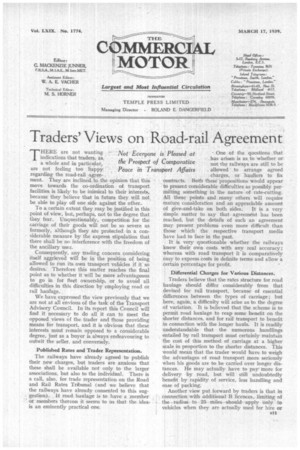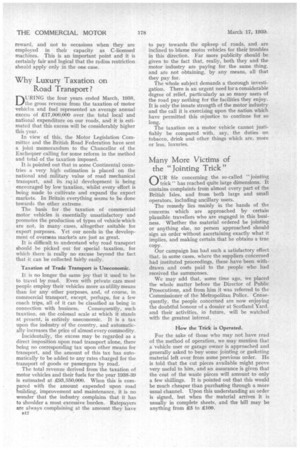Traders' Views on Road-rail Agreement
Page 29

Page 30

If you've noticed an error in this article please click here to report it so we can fix it.
HERE are not wanting indications that traders; as a whole and in particular, are not• feeling too happy regarding the road-rail .agree ment. They are inclined to the opinion that this move towards the co-ordination of transport facilities is likely to be inimical to their interests, because they believe that in future they will not be able to play off one side against the other..
To a certain extent they may be justified in this point of view, but, perhaps, not to the degree that they fear. Unquestionably, competition for the carriage of their goods will not be so severe as formerly, although they are protected in a considerable measure by the express stipulation that there shall be no interference with the freedom of the ancillary user.
Consequently, any trading concern considering itself aggrieved will be in the position of being allowed to run its own transport vehicles if it so desires. Therefore this matter reaches the final point as to whether it will be more advantageous to go in for fleet ownership, or to avoid all difficulties in this direction by employing road or rail haulage.
We have expressed the view previously that we are not at all envious of the task of the Transport Advisory Council. In its report this Council will find it necessary to do all it can to meet the opposed views of the trader and those providing means for transport, and it is obvious that these interests must remain opposed to a considerable degree, just as a buyer is always endeavouring to outwit the seller, and conversely.
Published Rates and Trader Representation.
The railways have already agreed to publish their new charges, but traders are anxious that these shall be available not only to the larger associations, but also to the individual. There is a call, also, for trade representation on the Road and Rail Rates Tribunal (and we believe that the railways have already consented to this sug gestion). road haulage is to have a memberor members thereon it seems to us that the idea, is an eminently practical one. One of the 'questions that has arisen is as to 'whether or not the railways are still to be allowed to arrange agreed charges, or hauliers to fix contracts. Both these propositions would appear to present considerable difficulties as possibly pernutting something something in the nature of rate-cutting. All these points and many others will require mature consideration and an appreciable amount of give-and-take on both sides, it is a very simple matter to say that agreement has been reached, but the details of such an agreement may present problems even more difficult than those which the respective transport media have had to face in the past.
It is very questionable whether the railways know their own costs with any real accuracy; whereas with road transport it is comparatively easy to express costs in definite terms and allow a certain percentage for profit.
Differential Charges for Various Distances Traders believe that the rates structure for road haulage should differ considerably from that devised for rail transport, because of essential differences between the types of carriage ; but here, again, a difficulty will arise as to the degree of variation. It is believed that the scheme is to permit road haulage to reap some benefit on the shorter distances, and for rail transport to benefit in connection with the longer hauls. It is readily understandable that the numerous handlings entailed by rail transport must certainly maintain the cost of this method of carriage at a higher scale in proportion to the shorter distances. This would mean that the trader would have to weigh the advantages of road transport more seriously when his goods are to be carried over longer distances. He may actually, have to pay more for delivery by road, but will still undoubtedly benefit by rapidity of service, less handling and ease of packing.
Another view put forward by traders is that in connection with additional B licences, limiting of the radiusto 25 Miles should—apply only to vehicles when they are actually used for hire or reward, and not to occasions when they are employed in their capacity as C-licensed machines. This is an important point and it is certainly fair and logical that the radius restriction should apply only in the one case.
Why Luxury Taxation on Road Transport?
DURING the four years ended March, 1938, Lithe gross revenue from the taxation of motor vehicles and fuel represented an average annual excess of £17,000,000 over the total local and national expenditure on our roads, and it is estimated that this excess will be considerably higher this year.
In view of this, the Motor Legislation Committee and the British Road Federation have sent a joint memorandum to the Chancellor of the Exchequer calling for some reform in the method and total of the taxation imposed.
It is pointed out that in some Continental countries a very high estimation is placed on the national and military value of road mechanical transport, and its rapid development is being encouraged by low taxation, whilst every effort is being made to cultivate and expand the export markets. In Britain everything seems to be done towards the other extreme.
The basis for the taxation of commercial motor vehicles is essentially unsatisfactory and promotes the production of types of vehicle which are not, in many cases, altogether suitable for export purposes. Yet our needs in the development of overseas markets are just as great.
It is difficult to understand why road transport should be picked out for special taxation, for which there is really no excuse beyond the fact that it can be collected fairly easily.
Taxation of Trade Transport is Uneconomic.
It is no longer the same joy that it used to be to travel by road. Even with private cars most people employ their vehicles more as utility means than for any other purposes, and, of course, in commercial transport, except, perhaps, for a few coach trips, all of it can be classified as being in connection with business. Consequently, such taxation, on the colossal scale at which it stands at present, is entirely uneconomic. It is a tax upon the industry of the country, and automatically increases the price of almost every commodity.
Incidentally, the excess may be regarded as a direct imposition upon road transport alone, there being no corresponding tax upon other means for transport, and the amount of this tax has automatically to be added to any rates charged for the transport of goods or passengers by road.
The total revenue derived from the taxation of motor vehicles and their fuels for the year 1938-39 is estimated at £93,550,000. When this is compared with the amount expended upon road building, improvement and maintenance, it is no wonder that the industry complains that it has to shoulder a most excessive burden. Ratepayers are always complaining at the amount they have n12 to pay towards the upkeep of roads, and are inclined to blame motor vehicles for their troubles in this direction. Far more publicity should be given to the fact that, really, both they and the motor industry are paying for the same thing, and are not obtaining, by any means, all that they pay for. The whole subject demands a thorough investigation. There is an urgent need for a considerable degree of relief, particularly as so many users of the road pay nothing for the facilities they enjoy. It is only the innate strength of the motor industry and the call it is exercising upon the nation which have permitted this injustice to continue for so long. The taxation on a motor vehicle cannot justifiably be compared with, say, the duties on tobacco, drink and other things which are, more or less, luxuries.
Many More Victims of the "Jointing Trick"
OUR file concerning the so-called " jointing trick" has reached quite large dimensions. It contains complaints from almost every part of the British Isles, and from both large and small operators, including ancillary users. The remedy lies mainly in the hands of the concerns which are approached by certain plausible travellers who are engaged in this business. Whether the material ordered be jointing or anything else, no person approached should sign an order without ascertaining exactly what it implies, and making certain that he obtains a true copy. Our campaign has had such a satisfactory effect that, in some cases, where the suppliers concerned had instituted proceedings, these have been withdrawn and costs paid to the people who had received the summonses.
We may add that, some time ago, we placed the whole matter before the Director of Public Prosecutions, and from him it was referred to the Conunissioner of the Metropolitan Police. Consequently, the people concerned are now enjoying the doubtful honour of a dossier at Scotland Yard. and their activities, in future, will be watched with the greatest interest.
How the Trick is Operated.
For the sake of those who may not have read of the method of operation, we may mention that a vehicle user or garage owner is approached and generally asked to buy some jointing or gasketing material left over from some previous order. He is told that the cut pieces available might prove very useful to him, and an assurance is given that the cost of the waste pieces will amount to only a few shillings. It is pointed out that this would be much cheaper than purchasing through a more usual channel. Upon this understanding an order is signed, but when the material arrives it is usually in complete sheets, and the bill may be anything from £5 to £100.




















































































